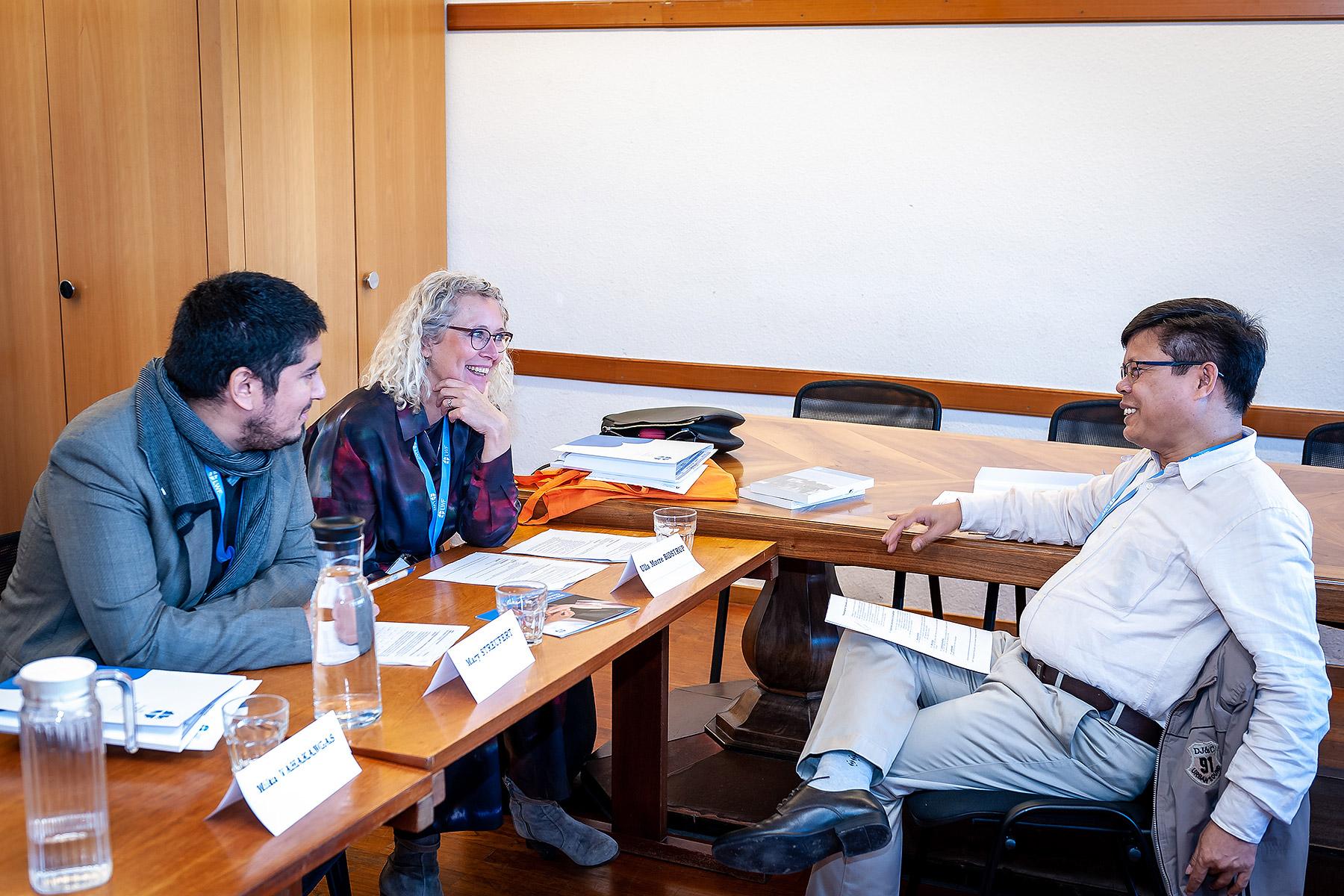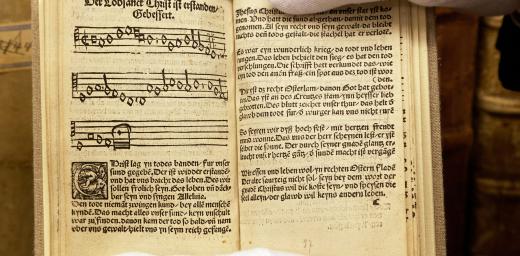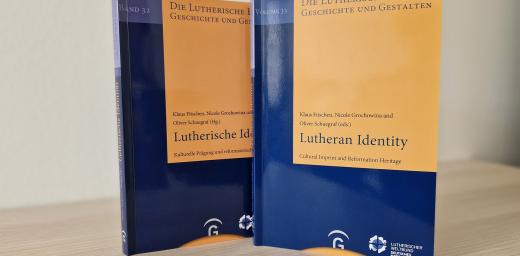Theological education that strengthens Lutheran identity

During the meeting in Geneva, Mr Diego Calquin Campos (Chile), Dr Ulla Morre Bidstrup (Denmark) and Rev. Dr Songram Basumatary (India), in a small-group discussion. Photo: LWF/S. Gallay
Final phase of launching a global LWF network for study and joint reflection
(LWI) – The Lutheran World Federation (LWF) is in the final stages of launching a network for Theological Education and Formation (TEF) to strengthen the study of theology, facilitate joint reflection, and build on the self-understanding of the LWF as a communion of Lutheran churches. The group will be made up of member church representatives and academicians from teaching institutions across all the seven regions.
A Strategic Advisory Group of educators, member church theologians and students led the two-year process of forming the network. During their final meeting, mid-January, in Geneva, they shared their impressions with Lutheran World Information (LWI).
Rooted in theological reflection
Dr Ulla Morre Bidstrup, Evangelical Lutheran Church in Denmark, said a direct connection between the Lutheran church and education reform was “no coincidence” since the 16th century Reformation began with the universities. “The issue from the very beginning of the Lutheran church is that every single Christian is going to be able to study the Bible and meet Christ in the scripture.” It is urgent for the LWF communion to ensure its work is rooted in theological reflection “not because of ourselves but for our witness and as a reliable voice in the future,” she added.
Theological education has an impact on the whole church, said Ms Jubleth Aurey Mungure, a student at the Tumaini University Makumira, an institution of the Evangelical Lutheran Church in Tanzania. “It strengthens the church by helping people know who they are. This makes the church more alive and have a theology in that context, responding to the needs of the people in that particular time.”
Lutheran communion self-understanding
The new LWF network, for which the advisory group also developed a strategy, will map resources and needs, promote mutual sharing, and develop theological leaders and educators.
Rev. Dr Bruk Ayele Asale, president of the Mekane Yesus Seminary in Ethiopia, emphasized the critical need and potential of this kind of exchange within a diverse communion like the LWF. “Without diminishing our contextual identity, it is very important to cultivate and nurture elements that really unite and give us the identity that we are one as Lutherans.” Joint work in theological education “provides that connectedness, and we can keep our sense of unity, whether we know it or not,” added the head of the Ethiopian Evangelical Church Mekane Yesus institute.
Without diminishing our contextual identity, it is very important to cultivate and nurture elements that really unite and give us the identity that we are one as Lutherans.
Congregation members “are demanding solid theological substance in preaching, Bible study” and other areas of church work, said Rev. Dr Songram Basumatary, head of the Department for Theology and Ethics at the Gurukul Lutheran Theological College & Research Institute in Chennai, India. Referring to the hundreds of applications the college and many others in the Asian region receive annually, he said the growing demand for theological education, should encourage “us to do better together and make our communion stronger.”
Rev. Danielle Dokman, Evangelical Lutheran Church in Suriname, emphasized: “Theological education helps us understand who we are and the vision of who we are becoming in the image of God. It is important for us to work together so that we can give of ourselves to the world.”
Theology as worship and spiritual growth
Theology student Mr Diego Calquin Campos, Lutheran Church in Chile, said theological reflection should not be viewed from the perspective of whether “it is useful for the church” but as “a form of worship that speaks to your heart and helps you see the world with different perspectives.” It should “vigorously give life to the church” and help it resist the temptation to follow unjust narratives, “because, the moment the church does that it becomes contingent and irrelevant for the next generations.”
Dr Mary J. Streufert, director for Justice for Women at the Evangelical Lutheran Church in America, reflected on spiritual growth. “For me, studying is praying,” said Streufert, who is also coordinator of the LWF Women in Church and Society network in North America. Theological reflection “allows me to be who I am.”
For Finnish theologian Prof. Mika Vähäkangas, a professor of missiology at the University of Lund, Sweden, “every Christian when reading the Bible is a theologian because you want to eventually have an understanding of what it is that you believe.” Theological education provides a wide perspective, which “helps you to be critical and self-critical.” Without such analysis and debate “our theologies become either very individualized or haphazard,” he added.
Vocation to serve
The strategic advisory group also included Rev. Dr Friederike Nüssel, Faculty of Theology at Heidelberg University, Germany; Rev. Dr Ágnes Pángyánszky, Evangelical Lutheran Church in Hungary; and University of Tübingen student Ms Lea Schlenker, Evangelical Lutheran Church in Württemberg, Germany.
Expressing his gratitude to the group for its work, Rev. Dr Chad Rimmer, LWF program Executive for Identity, Communion and Formation, recalled that “joint efforts in theology” is one of the founding pillars of the LWF. “By dedicating the time, people and resources to implement this global network, the Lutheran communion affirms its commitment to sustain access to innovative, transformative theological education.”
The upcoming global network will be a space “where learners can be equipped to realize their vocation to serve the world that God loves,” he added.





